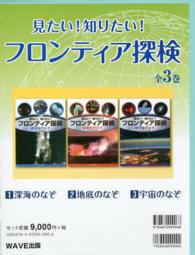- ホーム
- > 洋書
- > 英文書
- > Philosophy
Full Description
The aim of this book is to show that Bishop Berkeley (1685-1753) developed a highly original brand of corpuscularian physics. Berkeley is usually considered mainly as the creator of immaterialistic philosophy which rejects the very concept of matter and the existence of unperceived particles. However, Moked shows that in Berkeley's last major publication ("Siris", 1744) he was completely converted to the belief in the usefulness of the concept of, and even in the existence of minute particles.
Contents
Introduction. Part 1: Corpuscularianism and inductivism in the "Principles of human knowledge" and "Three dialogues between Hylas and Philonous". Part 2 "Siris" (I) - particles as theoretical entities assumed in hypotheses: including the Bishop's aether and Newton's hypothesis of aether in "Opticks", the anti-Cartesian trend and Berkeley's defence of empty space. Part 3: "Siris" (II) - particles as undoubtedly real. Part 4: "Siris" (III) - particles as of old. Appendices: 1 - Berkeley's early atomism as expounded in his theory of "Minima"; 2 - did Popper misunderstand Berkeley? 3 - the corpuscularian index of "Siris"; 4 - index of references to "Minima" in the "Philosophical commentaries"; 5 - the "Minima"-theory and the corpuscularian theories in "Siris". Notes. Bibliography. Index.







